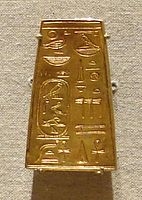Aramatle-qo
| Aramatle-qo | |||||
|---|---|---|---|---|---|
| Kushite King of Meroe | |||||
 Sitting statue of Aramatle-qo. Ägyptisches Museum, Berlin (ÄM 2249) | |||||
| Predecessor | Aspelta | ||||
| Successor | Malonaqen | ||||
| Burial | Nuri 9 | ||||
| Spouse | Atamataka, Piankh-her, Maletasen, Amanitakaye, Akheqa? | ||||
| Issue | King Malonaqen | ||||
| |||||
| Father | Aspelta | ||||
| Mother | Queen Henuttakhbit | ||||
Aramatle-qo[1] or Amtalqa was a Meroitic king.[2]
Dunham and Macadam, as well as Török, mentions that Aramatle-qo used the following prenomen and nomen:[2][3]
Prenomen: Wadjkare ("Re is one whose ka endures")
Nomen: Aramatle-qo
| Part of a series on |
| Kushite Monarchs and Rulers |
|---|
 |
| |
Family
[edit]Aramatle-qo was the son and successor of King Aspelta and Queen Henuttakhbit. He had several wives:[2]
- Atmataka, her pyramid is located at Nuri (Nu. 55). A heart-scarab belonging to Atamataka was found in Nu. 57.
- Piankhher. Buried at Nuri (Nu. 57)
- Akhe(qa?) was a daughter of Aspelta (and possibly Henuttakhbit). She may have been a sister wife of Aramatle-qo. She is buried at Nuri (Nu. 38)
- Amanitakaye, was a daughter of Aspelta and a sister-wife of Aramatle-qo. She is the mother of King Malonaqen. Buried at Nuri (Nu. 26). Known from a shawabti and other funerary items.
- Maletasen is known from many shabtis. She was buried at Nuri (Nu. 39).
Monuments
[edit]
| |||||||||||
| Aramatle-qo[2] in hieroglyphs | |||||||||||
|---|---|---|---|---|---|---|---|---|---|---|---|
| Era: Late Period (664–332 BC) | |||||||||||
Aramatle-qo is primarily attested by his pyramid Nu 9 in Nuri which dates to the end of the 6th or the 5th century BC. A votive object bearing his name originates from Meroe.[4] A piece of jewelry from Aramatle-qo's pyramid, a gold collar necklace which bears his name, was found here. It may have belonged to the king himself or to one of his courtiers.
- Nuri pyramid IX of Aramatle-qo.
- Napatan necklace spacer made of gold, 6th century BC. It is inscribed with Egyptian hieroglyphs in the name of Aramatle-qo.
References
[edit]- ^ Welsby, Derek A., The Kingdom of Kush, British Museum Press, 1996. p. 207.
- ^ a b c d Dunham, Dows; Macadam, M. F. Laming (1949). "Names and Relationships of the Royal Family of Napata". Journal of Egyptian Archaeology. 35: 139–149. doi:10.1177/030751334903500124. S2CID 192423817.
- ^ Török, László. The Kingdom of Kush: Handbook of the Napatan-Meroitic Civilization, (1997).
- ^ Török, László. Meroe City, an Ancient African Capital, London 1997, S. 236-39, ISBN 0-85698-137-0.
External links
[edit]Wikimedia Commons has media related to Aramatle-qo.


 French
French Deutsch
Deutsch
